Experts explain how Pokemon would survive in our world
Dreams really do come true
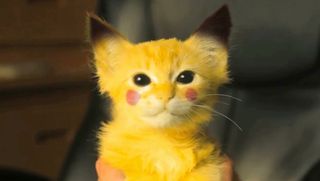
If you collect Pokmon, youve most likely noticed how some take cues from real-world animals in terms of design and mannerism. From classics like Seel and Wailmer, to Pokmon X and Ys Clauncher and Froakie, the types of animals used for inspiration are wildly varied. Also varied is how accurate these Pokemon parallels are to real-world animals--and how well they'd survive in North America. Shockingly, it's sometimes plausible, according to four scientists who work with bears, marine mammals, raptors (birds, not dinosaurs), and amphibians.
To find out which Pokemon could actually survive in the wild, we had a chat with the Alaska Department of Fish and Game regional wildlife supervisor Larry Van Daele, University of Alaska marine mammal biologist Kate Wynne, Carpenter Nature Center executive director Jennifer Vieth, and James Tumulty, University of Minnesota PHD student in the department of ecology, evolution, and behavior of frogs. The results are about as shocking as a Pikachus thunderbolt striking a poor, crying Torchic. That is to say, extremely shocking (and quite possibly electrifying).
Wailmer (Pokmon Ruby and Sapphire)
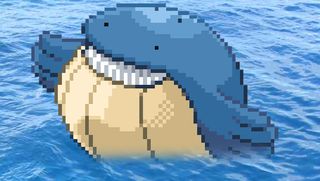
In spite of his cheerful bounciness and cuteness, Wailmer doesn't stand a chance in the real world. According to Wynne, hes missing an important part of a whale's structure. A real whale obviously needs to have a tail to get around; thats their main locomotion, she says. This guy its hard to tell how hes going to maneuver.
Another blow: Wailmer likes to come out on land and play, a sign of an early extinction--regardless of his fondness for holding in water to bounce around on land. Theyre usually doomed if they hit shore, Wynne says. Part of the reason is--and it would apply to this guy, too--their body is allowed to be big because theyre supported by water. When theyre not supported by water, everything collapses and crushes all of their organs. Ow. And while being able to dive 10,000 feet would give Wailmer the Blue Ribbon in diving depth, that lack of a tail makes it unrealistic. According to Wynne, sperm whales are the deepest, longest divers, and they can go down at least 6,000 or 7,000 feet--possibly 10,000.
Clauncher (Pokmon X and Y)
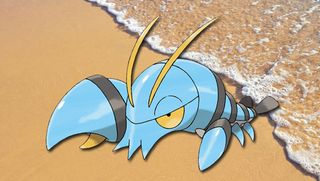
When you think of a lobster, the color that comes to mind is red. However, Claunchers light shade of blue isnt uncommon among the real-life crustaceans. Lobsters sometimes come blue, and theyre sometimes a little bit on the yellowish side, Wynne says.
The new Pokmon X and Y critter is pretty big for a lobster, but his claws are normal--except for the small fact that he's able to shoot water. Plus, even with those big pincers, they're especially not something that can crack a boulder, Wynne explains. She also noted that youd want to keep your digits away from the lil fella. That claw, the big one, which they call a crusher claw, can actually break bones; it can break your finger, Wynne says. You do not want it to get you. The other one pinches, and will cut you. Wynne, who works on an island known for its large fishing fleet, says if Clauncher were found in fishing nets thered be trouble and yes, make it double. If hes got a bad attitude, he could start shooting holes in boats. He could be dangerous.
Seel (Pokmon Red and Blue)
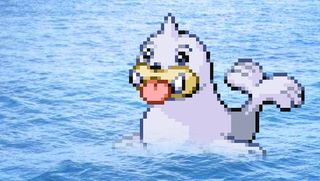
This pinniped Pokmon is one Wynne finds plausible (special ice and water-shooting moves not included). Its not any seal that lives now, but you could argue that [it's become its own] species, Wynne says. Compared to a seal, the Pokmon does have a realistic set of canine teeth growing into tusks. Some of the seals that live under ice definitely use their teeth to help open up holes in the ice. The little horn on its head would be the fantasy edition, Wynne says.
Sign up to the 12DOVE Newsletter
Weekly digests, tales from the communities you love, and more
Being awkward on land as opposed to water makes sense. But as far as Seels becoming more active in cold temperature, thats just not realistic. And [that Pokedex bit] about sleeping during the day--not so much, Wynne says. Theyre more tide-related. A lot of species do feed at night and around the evening, so it wouldnt be too hard a stretch, however.
Pancham (Pokmon X and Y)
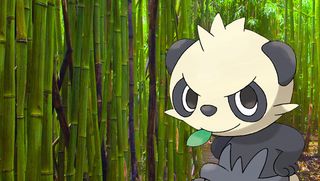
This little panda Pokmons penchant for mischief would fit right in with bears aged three to five; the ones no longer with their mother, but not yet sexually mature. Theyre the ones that get in trouble more than any other type of age category, Van Daele says. Consequently, theyre the ones that die more often than any other age category. They come into town, try to get into peoples coolers, try to break into cabins, and get themselves into dumpsters.
Bears are territorial and will fight when necessary, though bears like to intimidate via other methods aside from fisticuffs. Glaring would be something that a panda bear could do, Van Daele says of the Pokmons description, explaining how bears will usually posture, growl, or perform bluff charges to intimidate. Of course, a bear of Panchams size probably wouldnt get away with intimidation tactics.
Pangoro (Pokmon X and Y)
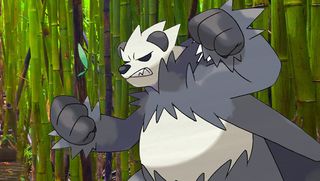
Nicknamed the panda from hell, by Van Daele, the evolved form of Pancham would make for an odd bear. Size-wise, a panda can be six feet tall and weigh about 270 pounds or so, making him quite the Ursa Major. Pangoro's demeanor and temperament wouldnt suit him, or even benefit him--fighting moves or otherwise. Pandas are exclusively vegetarians, Van Daele explains. As such, they usually dont have that violent a temperament. Most vegetarian type animals tend to be a little bit more laid back--especially pandas. Unless you really try hard, a panda isn't going to get super violent on you like this one would.
Bears also dont make fists for punching. Van Daele says that if youre looking at a brown bear, youll notice they will punch things--But they do that with an open paw. [Even] if they could turn their fingers to that degree, it wouldn't be beneficial to them, because they'd end up hurting their hand when they hit something with their fingers in that configuration. In short: Pangoro would have to lay off the martial arts or risk impaling its hands on its own claws.
Teddiursa (Pokmon Gold and Silver)
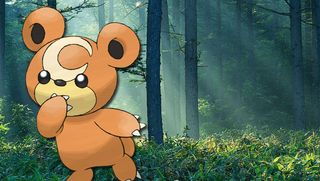
Van Daele thought Teddiursa looked like it was modeled after the adorable Pooh Bear. The bears home of wooded areas and mountains makes sense to him; hoarding food, however, is not something a bear would actually do. Thats more Winnie the Pooh than a real bear, Van Daele says. If they get something large, like a deer, elk, or moose, they'll cover it up and defend it and come back to eat for a little bit. But thats not really hoarding food. Theyre not like squirrels.
As far as being described as cunning, Van Daele says thats a good way to describe a brown bear. Those particular bears are placed between a dog and primate regarding their level of intelligence. What that tells you is theyre pretty darn smart in the animal world, he says, making Teddiursa a Pokemon that could likely outsmart the average opponent.
Ursaring (Pokmon Gold and Silver)
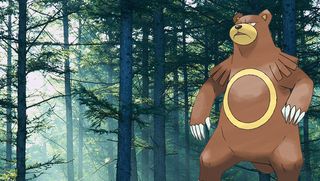
If Ursaring roamed the wilds of Alaska right now, Van Daele may not study bears any longer. Why? One seemingly small reason: these imaginary bears love to lounge in trees. Can you imagine that? Brown bears sleeping in treetops, jumping down on you? Wed all be in trouble, Van Daele laughs. Of some solace is the fact that, compared to other brown bears (which Van Daele considers Ursaring grouped with), this Pokmon is small. A Kodiak bear, for instance, can be nine feet tall and weigh 1,200 to 1,500 pounds, he says. If they stood on their hind legs, they could put their head in a basketball hoop. This would be a little guy, perhaps an average-sized female grizzly in Yellowstone.
As far as training bears goes, Van Daele says they are very trainable when young. Someone trying to impersonate Ash Ketchum might have some trouble catching an older bear, though. They get upset if they dont get the proper amount of food, rather than being appreciative, he says. And they will test their trainer constantly, because theyre really independent animals.
Ho-Oh (Pokmon Gold and Silver)
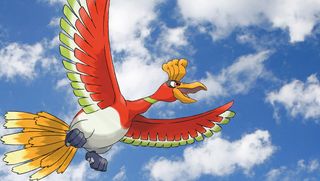
Aside from his massive size, Ho-Oh wouldnt be too out of place in reality. In the bird world, most of the males are brightly colored to attract a mate and show how fit they are, Vieth says. The biggest pitfall--and this applies to all bird Pokmon--is the sheer size of the bird. Vieth says that the largest bird scientists think was able to fly is the Giant Teratorn, a bird with a 23-foot wingspan and weighed between 154 and 171 pounds. In stark contrast is Ho-Ohs 438 pounds, meaning he most likely wouldnt be able to take get airborne, based on Vieth's research.
If for whatever reason, Ho-Oh could achieve lift-off, his Pokdex entry in Pokmon Gold about flying continuously wouldnt be farfetched (or Farfetchd). There are birds that sleep on the wing, so that they pretty much, like Albatross, are out at sea gliding on air for a long time, Vieth says. Its the shape and structure of the wing that allows them to do that.
Talonflame (Pokmon X and Y)
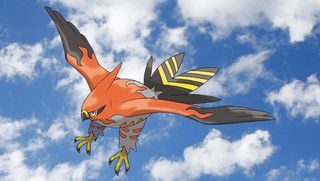
The Talonflame would be the fastest animal in existence if it were real. The fastest known bird currently is the Peregrine Falcon, and they can dive up to 248 miles per hour," says Vieth. "Talonflame's 310mph is faster than the Peregrine. I dont think it would happen, but scientists also didnt think Peregrines could dive that fast. They used to have an estimate of 100 miles per hour.
Vieth notes that two raptors are combined in the Pokmons design: the Peregrine Falcon--particularly in the eyeline, wing shape, and barring on the body--and a Secretary Bird, thanks to its Brave Bird kicking move. Its a kind of weird raptor because it doesnt fly, but it actually kicks its prey and kills it with its feet, Vieth says. One drawback to the flight speed of the Talonflame is that its common for birds of prey to injure themselves. If they dont kill their prey right, they can rip off their talons, Vieth says. You can hit something too hard, veer up at the wrong time theres lots of ways they can hurt themselves.
Louis Garcia is a former journalist, having contributed to publications that include 12DOVE, Official Xbox Magazine, Game Informer, City Pages, 507 Magazine, and more. While he is a lifelong fan of video games, he's currently following another passion of his – alcohol. Louis is the lead storyteller at Crafted For All and an administrator for the Brewers Association's Diversity, Equity, and Inclusion Committee.
If a month of Pokemon TCG Pocket has taught me anything, it's that Mewtwo is still the world's strongest Pokemon

Massive Pokemon leak is over for now as leakers say staying online while Nintendo searches for them "would not be smart," but call out other leakers for spreading "fake" information before they leave
Most Popular

